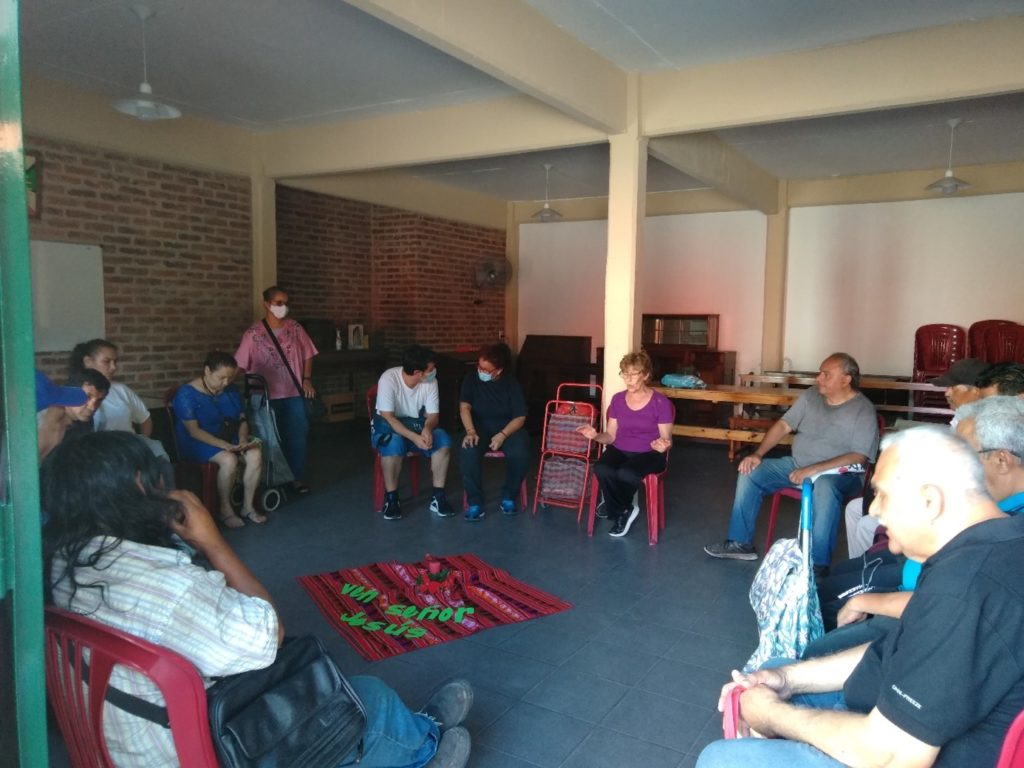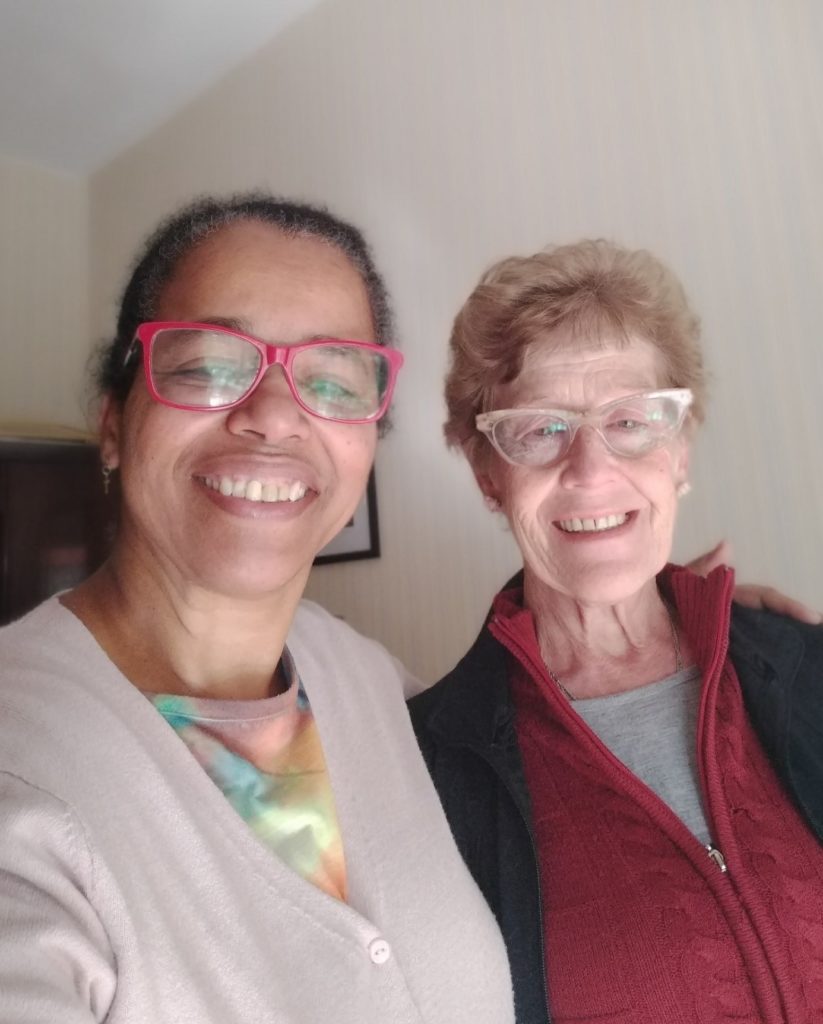Pastoral care of listening in Buenos Aires

Listening to each other, getting to know each other.
We would like to unite with each one of you in the joy and hope that comes from Jesus the Servant and Saviour, and wish you PEACE! How good it is to be able to be with you, in community, to share what moves us in the depths of our hearts and spirits, in life and mission, on this earth where we live.
We are sending you this contribution from Buenos Aires, the capital of Argentina, where we live in the Villa Luro district and are part of the San Francisco Solano parish.
Argentina is currently going through one of the worst economic, political, and social crises in its history. According to government figures, almost 40% of the population is poor, and the level of destitution has reached 9%. In the capital, there has been a 25% increase in the number of homeless people. It is estimated that 2 out of 3 children are poor.
Behind these figures are persons and for each of them there are aspirations, dreams, and emotions. In the parish of San Francisco Solano, many people come in search of food every Wednesday. They are impoverished families, immigrants, and homeless people with nowhere to stay.
When I saw the people arriving at the parish Caritas in search of food, something happened in my heart: I wanted to get closer to them, to get to know them, to listen to them. I was overwhelmed to see the sad looks on some people’s faces and the suffering on others. Antoinette Fage’s words echoed in my mind: “I ache for the pain of the poor”, and I asked myself: What could I do for these people? As I entrusted this concern to prayer, I was inspired: Why not listen to them, simply be there for them, and promote a space for dialogue? We raised this question as a community of little sisters and together we agreed that we could do something. Then I spoke about it with Susana Sánchez, a lady from the parish, and we created the Listening Pastoral project: “Listen and get to know one another”. The first step was to get closer to the people and invite them to freely attend the meetings, making it clear that this was a time for them. At each meeting, prepared with the heart, and through group dynamics, people began to trust each other and share their lives, their difficulties, their dreams, and their hopes.

Delving into each person’s story is like treading on sacred ground. Some of these stories are touching: the situation of homeless people looking for a place to sleep and wash, and stories of fathers and mothers who for various reasons are far from their families. Sometimes they have fallen into drugs and alcohol, other times there has been a breakdown in the relationship for random reasons. Sharing these stories, with all the emotional charge that comes with it, evokes trust. We hear the cry that requires attention, hospitality, and closeness.
Listening, lending an ear and a heart to welcome each person with their suffering, their story, and their desire to escape, has opened our hearts to see in them Jesus who is suffering today, who is on the margins of society. This makes us look with compassion.
We meet every Wednesday. There are 4 different groups during the month; each one is on their own journey, but they are all receptive to this time dedicated to them.
In the group, we have been testimony to the personal journeys of the participants since they started attending the meetings. Here is one of them:
Jorge is an elderly man. He comes to Caritas looking for help. In March this year, his son suddenly died. It was too much for Jorge to bear, and he fell into depression, going several days without showering, eating, or taking care of himself. He would come to the group and cry, saying “I don’t want to live anymore”. We took him in and listened to him.
The group was very affectionate towards Jorge. It was touching to see all these men living on the streets who were so moved, making an effort to listen to him with respect.
Gladys, a lady in the group, sent him a message of encouragement, hope, and faith every day on her mobile phone.
We invited Jorge to come every week to help with the meetings and simply to be with us. He would arrive a little early and share his suffering, his anger at God. He would often say to us: “What I need today is someone to listen to me”.
Little by little, hope found its place in Jorge’s heart. He started helping us at meetings and church. Today he tells us: “I’m well, I’m at peace. I’d like to stay here with you”.
At one of the meetings, the theme of which was “The gift of life as a gift from God”, Jorge said after a group dynamic: “I saw myself in this gift from God, life is a gift. I also saw my son, he was happy. Life is a gift that, in God, has no end. My heart is happy; it’s at peace”.
Promoting this place of welcome, listening, and closeness has been a gift from God for us. There we find Him, He comes to meet us, and He comes to find each person who comes to the group.
Sister Agda da Penha de Sousa
_________________________________________________________
My name is Susana Sánchez. I’ve been in the parish of San Francisco Solano (Buenos Aires) since I was a teenager. I’ve been a catechist and Eucharistic minister.
A while ago, I wanted to do something for those who came to our parish Caritas. I didn’t know how to go about it and I stopped thinking about it. But it seems like God wrote it down in his diary.
In September 2022, Sister Glaides introduced me to Sister Agda, who shared the same concern. I was surprised and thought: “Is this the right time? I’m not yet in the right frame of mind to take on a new task. I’m 70, with health problems and a large family”. It didn’t seem easy.

As nothing is impossible for God, I thought back to the prophets who didn’t know what to do or say in the face of the unknown. And I threw myself into the void: “The Lord will know; He knows us”.
And so began this beautiful journey with Sister Agda, for the people who come to our parish Caritas. We thought about how to implement the project. First, we had to give it a name: Listen and get to know one another. Secondly, to set objectives: to listen to people with attention and respect, so that they feel that this time belongs to them. Thirdly, to think about resources to motivate everyone to take part. This is how we took our first steps.
The beginning was a bit hesitant. Some weeks they were happy to accept the invitation. Other weeks, they would leave without understanding what we were doing here. My heart was telling me: “And what are we doing here? Are we imposing something on them that they haven’t asked for? We knew it was a good project, but we had to be patient and above all believe that Jesus is in the midst of everyone and that he works even if we don’t see the results. And we continued on our path with many questions.
With ups and downs, these meetings began to take shape. It’s what we hoped for and what they expected. Every evening was a challenge. Hearts began to open up, to confide, to make the place their own. I felt my heart squeeze when I heard of painful realities. I realised that this time truly meant something, that it was worth my efforts, and I felt a little ashamed of having had doubts.
Poor people whose lives haven’t been easy ask for very little: only that they be acknowledged by name, that they find an ear that listens and does not judge them, a smile that welcomes them, a welcoming word and arms that make them feel that they are children of God, whatever path they have taken in life. We are ready to listen and to receive them. God will do the rest.
I would like to express my heartfelt thanks to the community of the Little Sisters of the Assumption for inviting me to be part of this service to the poorest of the poor.
Susana Sánchez
